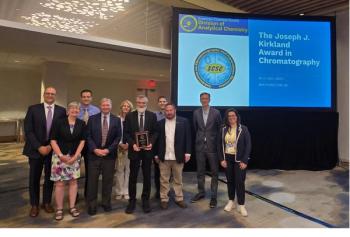
- November 1999
- Volume 17
- Issue 11
- Pages: 998–1005
Monoliths as Stationary Phases for Separating Biopolymers – Fourth-Generation Chromatography Sorbents

Monoliths are chromatography sorbents cast into columns as a single continuous piece in contrast with regular chromatographic sorbents, which are packed as individual particles. The guest authors compare three such novel sorbents with a conventional particle-packed column.
Monoliths are chromatography sorbents cast as a homogenous phase into chromatography columns as a single, continuous piece. In contrast, regular chromatographic solvents are packed as individual particles. In this month's "Column Watch," the guest columnists compare three of these novel sorbents with a conventional packed-particle column in terms of porosity, static, and dynamic capacity. Monoliths show flow rate–independent separation efficiency and dynamic capacity as well as higher porosity than conventional columns.
Articles in this issue
about 26 years ago
A Coin-Toss Experiment, Part II – Limits of the Analogyabout 26 years ago
Readers' Question – Carryover, Mobile-Phase Temperature, and Column Careabout 26 years ago
Cleaning ValidationNewsletter
Join the global community of analytical scientists who trust LCGC for insights on the latest techniques, trends, and expert solutions in chromatography.





